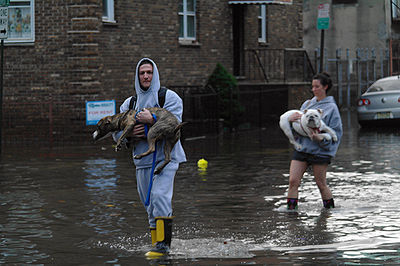; ?>/images/banner.jpg)
 The loss of personal property, homes, businesses and worst of all, loss of human life are devastating when natural disasters occur. One of the most under-reported and overlooked aspects of natural disasters such as hurricanes, mass flooding events, tornadoes, and wildfires, are the countless animal casualties and displaced pets that result from these events.
The loss of personal property, homes, businesses and worst of all, loss of human life are devastating when natural disasters occur. One of the most under-reported and overlooked aspects of natural disasters such as hurricanes, mass flooding events, tornadoes, and wildfires, are the countless animal casualties and displaced pets that result from these events.
In the case of storms and wildfires, as the result of climate change, the frequency and severity of these events are poised to get worse as is clearly evidenced in the past decade. In addition to preparing your homes, business, and families for weathering these events, it is important to also plan for your pets.
Identification
Be certain to have all dogs and cats fitted with identification tags with all of your pertinent contact information in the event they were to get lost. Even better, I would recommend having them micro-chipped, especially cats who notoriously are very good at wriggling our of their collars or losing their tags. Microchips are encased in tiny capsules that are implanted by a simple injection into the loose skin between the shoulder blades on the dorsal region of dogs and cats. They contain a chip number that is unique to the pet’s family that pulls up all of the owner’s pertinent contact information. When lost animals are brought into shelters and veterinary clinics, the first thing staff will do is scan for a microchip.
Be certain to always make sure that chip services are up to date. For many pet microchip companies, the information a chip is attached to remains stored only if the service is kept current, usually by paying a nominal yearly fee. In addition to keeping chip information current, when pets are lost, most services also include sending out blue alerts to all local shelters within a certain radius of where the pet was reported missing.
I cannot overstate the importance of microchips. Home Again, one of several microchip companies, alone recovers one lost pet every 6 seconds in the United States.
Keep Enough Carriers On Hand
This may not apply to large dogs, but in general, large dogs are leash trained and more manageable to keep restrained in the event of evacuation. For cats and little dogs that are easily spooked and prone to running off, it is recommended to always evacuate with pets secured within carriers. Most shelters these days will allow pets to enter but often have a carrier requirement for entry.
Not having enough carriers for each individual pet makes this process more difficult and stressful for the pets involved. I have learned this from personal experience having had three cats for two carriers, with two of the 3 cats being rather on the portly side. It was not fun for my kitties or for us to cram two of them into one carrier that was meant for just one.
Pack All Medications
If you are planning for a potential evacuation, be certain to pack all essential medications for your pets. For many diseases such as congestive heart failure, chronic active hepatitis, and diabetes to name a few, a pet’s life depends on receiving timely medication.
Preventives are not essential for sustaining life, but with excessive standing water following hurricanes and mass flooding events, mosquito blooms are inevitable. Mosquitoes are the vector for heartworm transmission in dogs and cats. Be certain to keep them up to date on heartworm preventives especially after natural disaster events that lead to mass flooding and prolonged periods of standing water.
Be Certain That Immunizations & Parasite Screenings Are Up To Date
In the event that you cannot take your pet with you as you are forced to evacuate, hurricane safe kennels are an option to leave your pets. Most kennels require up to date immunizations, negative stool analysis, and negative heartworm screening within a year’s time prior to a pet’s stay. These are policies intended to keep all animal guests in a kennel as safe as possible from infectious disease and parasites. Do not wait until a natural disaster is knocking on your door to make certain all pets are up to date with their yearly visit.
In addition to kennels, if you keep your pets to accompany your family at a public shelter, most will require at least an up to date rabies immunization, given the danger the disease poses to human health. Thus, it is also prudent to keep your pet’s current rabies tags and/or certificates on you to prove that they are up to date.
Dr. Roger Welton is a practicing veterinarian and well regarded media personality throughout a number of subjects and platforms. In addition to being passionate about integrative veterinary medicine for which he is a nationally renowned expert, Dr. Welton was also an accomplished college lacrosse player and remains to this day very involved in the sport. He is president of Maybeck Animal Hospital , runs the successful veterinary/animal health blogs Web-DVM and Dr. Roger’s Holistic Veterinary Care, and fulfills his passion for lacrosse through his lacrosse and sport blog, The Creator’s Game.
